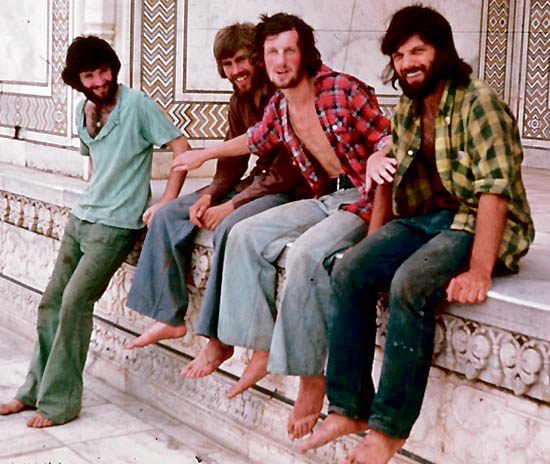FLASHBACK: From left, Tom Dowling with Peter Cooper, Phil Wellings and Ken Stokes outside the Taj Mahal – a week before the roadside attack in June 1974
AS THE the sun began to rise on a dark and almost deserted Iranian highway, 20-year-old Tom Dowling’s life was about to change forever.
Returning from a Boys Club road trip to Mount Everest, Tom and his three friends were attacked while they slept inside – and on top – of their old minibus.
One bullet crashed into the head of one of Tom’s pals – luckily he made a full recovery. But another bullet smashed through Tom’s back, severing his spinal cord and leaving him paralysed from the chest for life.
It was a cruel, nightmare end to what had been a dream journey. And it could so easily have ended Tom’s life.
But six months later he was back at work – and planning new challenges . . . to change people’s perceptions of disability and, perhaps one day, to create a free community newspaper that would help people get the most from life, whatever their age or ability.
In October 2013, Liverpool Echo journalist JANET TANSLEY told how Tom has used the encounter that almost ended his life as a spur to his work, bringing information and hope to many thousands of people.
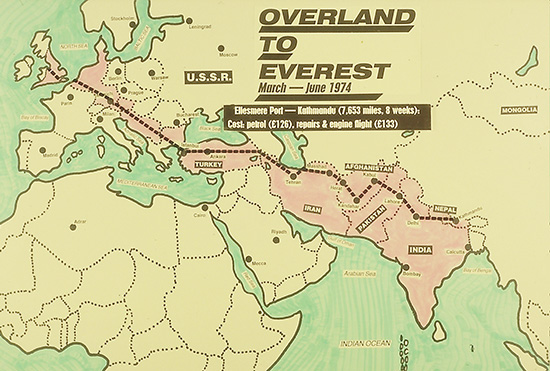 SITTING at home watching TV, Tom Dowling chuckled as his toddler son, Joe, carefully brought his shoe laces together in a bid to mend his paralysed legs.
SITTING at home watching TV, Tom Dowling chuckled as his toddler son, Joe, carefully brought his shoe laces together in a bid to mend his paralysed legs.
The little would-be electrician was convinced it would jump-start his father’s lifeless limbs.
“As my legs kicked forward in spasm,” smiles Tom, “he said ‘there you go dad, I’ve cured you’…”
Forty years since a bullet severed his spinal cord, Tom retains a sense of humour and optimism.
But his easy-going nature belies a passion, borne out of personal experience, to provide a first class news service for people whose lives are affected by disability – and to change attitudes along the way.
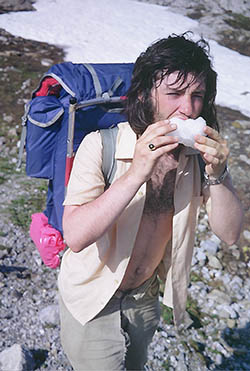 Tom says: “Writing about disability was never my plan. Ever since I can remember I was going to be a professional footballer. But when the scouts didn’t come calling I had to quickly find another career. Luckily, I fell into journalism at 16 and was determined to be a sports writer. But life got in my way.
Tom says: “Writing about disability was never my plan. Ever since I can remember I was going to be a professional footballer. But when the scouts didn’t come calling I had to quickly find another career. Luckily, I fell into journalism at 16 and was determined to be a sports writer. But life got in my way.
“After my injury, I soon realised how disability isolates so many people – those with a disability and their families, including me and mine.
“There were charity newsletters around for people with various conditions but they were all preaching to the converted. There was nothing in mainstream papers to help readers – and change people’s perceptions about disability – and that’s what I wanted to do.”
In 1983 the Liverpool ECHO launched his I Can Do That! column, which is now the paper’s longest-ever running column, appearing every Thursday. And in 1997 the ECHO developed the column into a stand alone paper that ran for seven years.
When that paper closed in 2004, Tom left the company and the following year set up the new All Together NOW! charity newspaper.
Liverpool-born Tom has a contagious enthusiasm for life and his ethos is to “make the best” of things.
As he has since 1974.
Together with pals Phil Wellings, Ken Stokes and Peter Cooper, he set off in a Bedford minibus on the ultimate road trip to Everest base camp: “I’d seen Summer Holiday with Cliff Richard,” grins the father-of-three.
“I found a map of an overland trip to the Himalayas and that was it.
 “We were sponsored by Typhoo so we’d got boxes and boxes of teabags which we used as baksheesh (bribes) to ease our way through borders and customs.
“We were sponsored by Typhoo so we’d got boxes and boxes of teabags which we used as baksheesh (bribes) to ease our way through borders and customs.
“We didn’t consider the dangers. We were driving 8,000 miles through the desert and mountains with none of us knowing about engines. We just thought that if we broke down on the Khyber Pass we could call the AA!
“We actually wanted to walk to the Everest base camp but by the time we got there we were too exhausted.”
Two weeks after leaving Kathmandu, as night fell, they parked up by a roadside about 100 miles from Tehran to get some sleep.
“We wound up the whole trip that night – played cards to see who would get the mementoes and discussed where we would go next.
“That night Phil and Ken slept inside the van, Peter and I up on the roof in the luggage rack. I woke up at 5.30am to a ‘Hollywood’ sunrise and thought ‘life just can’t get any better than this’
But seconds later the van’s windows were smashed in an onslaught of rocks and stones being hurled by two hooded attackers.
“I sat up and Peter got down, shouting ‘they’ve got a gun’. Then I felt what was like a boulder crashing into my sternum.
“I was shouting and waving my arms but as I put them down I felt these cold lumps of jelly – which were my legs.”
 Ken had been shot through the head, but, luckily, he went on to make a full recovery.
Ken had been shot through the head, but, luckily, he went on to make a full recovery.
Tom had been shot, too. But the bullet that crashed through his shoulder blades severed his spinal cord, confining him to a wheelchair for life.
The four made it to a hospital in Quazvin, an hour’s drive away. A week later Tom and Ken were flown back home to Walton Neurosurgery Hospital. A month later Tom was transferred to the spinal unit at Southport Hospital.
He says he felt fortunate he still had the use of his arms: “All I had to come to terms with was the psychological impact of not being able to stand and walk and having to use a wheelchair.
“I had the easy part – it was always much tougher for my family and friends.”
Six months later Tom was working for the Ellesmere Port News and went once more on his travels before joining the ECHO.
“Phil and I went on another road trip across North America. I wanted to see what challenges I would have, camping in a wheelchair. It was tough but I learned to be resourceful…”
 Ten years later Tom met his wife, Lynne, with whom he has Joe, 23 and twins Dan and Ben, 21.
Ten years later Tom met his wife, Lynne, with whom he has Joe, 23 and twins Dan and Ben, 21.
“I was just so incredibly lucky. I knew any partner would be seeing me as I am – not as I was. But your confidence is rocked. I wondered why on earth she would be attracted to me.
“It’s so easy to put a barrier around, to save yourself from being hurt but Lynne just accepted the situation.
“Of course there were things I would have loved to have done with Lynne and the boys but I hope there have been other benefits along the way.”
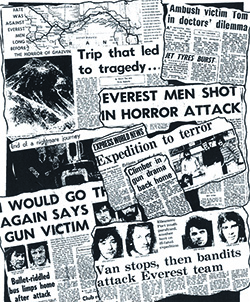 Tom says the issue of disability is now at a crossroads with the link between it and poverty never closer.
Tom says the issue of disability is now at a crossroads with the link between it and poverty never closer.
“It’s getting tougher and tougher for severely disabled people. Cutbacks are affecting lots of people, but more so those affected by disability.
“There is a lack of support and, in some ways, attitudes have gone backwards. We need to stop that. And that makes my work more important than ever.
“I really hope I can continue for another 40 years – that’ll make me 100. The speed at which medicine and technologies are advancing who knows what’s in store for any of us . . .? By then I might even be putting on my old football boots again!”
A great paper – but we need more partners to get on board
HAVING dreams and ambitions are great. But turning them into reality often depends on who comes on board with you.
That’s something Tom Dowling knows all about.
“Forty years ago I was so, so fortunate to have had three great friends who all wanted to share a dream three-month road trip to Mount Everest,” he says.
“Now forty years on, I’m lucky to be living another dream – trying to make All Together NOW! one of the best-read FREE charity papers in the UK.”
This time, too, he says, he has managed to get some fantastic support from like-minded people and their organisations.
“I can’t thank them enough – they’ve given us so much help and recognise the real social value of the paper.
“But for us to keep going as we are – and to develop the paper to its full potential – we need even more partners to get on board. ”
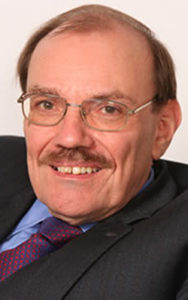 Someone else who shares these views on the importance of information is Sir Bert Massie, former chair of the Disability Rights Commission.
Someone else who shares these views on the importance of information is Sir Bert Massie, former chair of the Disability Rights Commission.
Sir Bert says: “Unfortunately, information is frequently discounted as being unimportant.
“During my career I found that raising money for information services was difficult because individuals and companies were more interested in funding equipment or specific projects which had a higher profile.
“Time and again I had to explain that before disabled people could request equipment or services they needed to know what was available.
“Everything starts with information. There is a danger today that newspapers such as All Together NOW! can have their mission underestimated: that the information it contains is just information. It is much more than that. It is the key that opens a thousand doors.”
CURRENT partners include Liverpool CCG, Liverpool Community Health Trust, Medicash, The Morgan Foundation, Park Group, and United Utilities.
IF YOU, or your organisation, would like to help All Together NOW! please contact Tom at news@alltogethernow.org.uk or call him on 0151 230 0307

